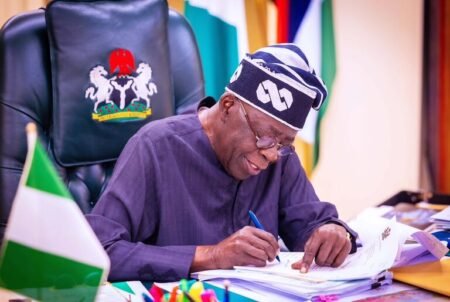The Federal Government may strip existing core investors of their stakes in Nigeria’s 11 power distribution companies (Discos) under a sweeping legislative overhaul proposed in the Electricity Act (Amendment) Bill 2025, currently before the National Assembly.
Sponsored by Senator Enyinnaya Abaribe, Abia South, the bill seeks to overhaul key provisions of the 2023 Electricity Act. If passed, the Nigerian Electricity Regulatory Commission (NERC) would be empowered to compel investors in the Discos to recapitalise within 12 months or face consequences ranging from share dilution and receivership to outright re-privatisation.
A draft copy of the bill, obtained by Chronicle NG, reveals that the planned amendment introduces stiff measures aimed at addressing the persistent underperformance and worsening financial instability in the power sector.
The amendment has already passed its second reading in the National Assembly, with debates ongoing. According to its provisions, power sector stakeholders failing to inject fresh capital will risk forfeiting their stakes to new investors.
“The commission shall consult widely and take such measures as are necessary to ensure that the implementation of any order or directive on recapitalisation under sub-section (3) of this section neither disrupts continuity of service nor undermines investor confidence in the NESI,” the bill states.
There are currently 11 electricity distribution companies in Nigeria: Abuja, Benin, Eko, Enugu, Ibadan, Ikeja, Jos, Kaduna, Kano, Port Harcourt, and Yola Discos.
Sections 228J and 228K of the proposed amendment mandate the Minister of Power, in consultation with NERC, to establish a financial reform blueprint within one year of the Act’s passage. This includes attracting long-term local currency investments and eliminating “unstructured and regressive subsidies” that have crippled growth in the Nigerian Electricity Supply Industry (NESI).
The Act mandates “a transparent and predictable tariff regime that allows for cost recovery for efficient operators” and urges the concession of some power plants managed by the Niger Delta Power Holding Company. Fiscal incentives, clearer definitions of federal and state equity holdings, and special financing for gas-to-power projects also feature prominently.
A statement in the bill reads: “The framework referred to under subsection(1) of this section shall give regard to the extant National Electricity Policy and Strategic Implementation Plan and aim to attract and de-risk investments across the power value chain from generation, transmission, distribution, reduce diesel and petrol-based self-generation and address crippling financial crisis and debt overhang in the Nigerian power sector.”
However, the bill has been met with strong resistance from the Forum of Commissioners of Power and Energy, which warns that the proposed changes could reverse the gains of the Electricity Act 2023 and undermine Nigeria’s newly decentralised electricity market.
Power Minister, Adebayo Adelabu, has consistently criticised the Discos over their inefficiencies. Speaking at a press conference earlier in the year, he said, “The performance of the Discos has been grossly underwhelming. We can no longer tolerate excuses. If you can’t invest, give way to those who can.”
The May 2025 report by the Bureau of Public Enterprises revealed that over 70% of the Discos had failed to meet key performance targets set during the 2013 privatisation process.
In response to the reform bill, an official of one of the power distribution firms, who requested anonymity, noted that “It is totally irrelevant to say the law affects Discos. When the National Assembly makes laws, it is binding on all of us. What we should all do is to collectively implement and follow the law.”
He also backed NERC’s strengthened role under the amendment: “The regulatory commission has its powers, and when there is an amendment that further enhances that power, we are all for it. We believe in the wisdom of the National Assembly to amend the law, and we are ready to work with all stakeholders to ensure that the laws are implemented.”
Still, sector analysts believe that the proposed 12-month recapitalisation window is too short. Power market expert, Habu Sadiek, stated, “I think it’s a good thing. But the government needs to do two things before initiating a recapitalisation programme: settle all outstanding subsidy payments and allow cost-reflective tariffs to prevail.”
Sadiek further argued that “Giving the current Disco owners 24 months, rather than 12, would have been better, similar to the Central Bank of Nigeria’s recapitalisation programme.”
Another expert, Chinedu Amah, lamented Nigeria’s “policy overload,” suggesting the real issue lies in the failure to implement existing policies effectively. “We have policies on everything in Nigeria… Maybe we should just remove all the subsidies, flatten the tariff regime, and allow the market to drive investments,” he noted.
The proposed changes come amid a broader government restructuring plan already underway. Adelabu previously announced the launch of a pilot programme involving the overhaul of two underperforming Discos—one in the North and one in the South. This initiative, developed in collaboration with the Japanese International Cooperation Agency, is expected to conclude by August 2025.
Providing an update, Bolaji Tunji, Special Adviser on Strategic Communications and Media Relations to the Minister, said: “It is an ongoing thing and we will brief you at the appropriate time.”
The Electricity Act (Amendment) Bill, 2025, is still undergoing legislative deliberation, and its final provisions may be modified. Still, analysts agree that its passage could herald a new era for Nigeria’s struggling electricity sector—if its ambitious reforms are matched with consistent implementation and financial discipline.









